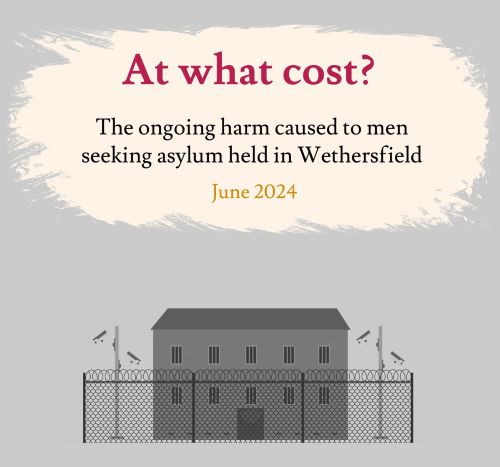At what cost? The ongoing harm caused to men seeking asylum held in Wethersfield
Our new report with Humans for Rights Network (HFRN) reveals that increasing numbers of men placed in RAF Wethersfield by the Home Office are self-harming and attempting suicide.
According to Home Office data, in the first three months of 2024 there were:
-
30 recorded occurrences of men self-harming or attempting suicide, or at serious risk of doing so;
-
91 occurrences of men expressing that they were considering suicide or self-harm; and
-
Over 160 safeguarding referrals made regarding suicide and self-harm.
Six months ago, HFRN and HBF published evidence that the use of the ‘prison-like’ asylum camp at RAF Wethersfield was causing a significant deterioration in the mental and physical health of hundreds of men, many of whom have already experienced great trauma. Our latest report, ‘At What Cost?’, shows that very little has changed in Wethersfield since.
The longer men are held in Wethersfield, with little to do, no sense of when they might be moved, and growing feelings of desperation, the more tensions rise and there is a risk of violence. Many men are becoming too scared to leave their rooms. In February 2024 alone, 12 referrals were made to the Home Office safeguarding team regarding people in Wethersfield who were not eating. In February and March, 18 referrals were made about men who had been the victims of assault.
Not only has the Home Office continued to move more people into Wethersfield, but it has also not appropriately responded to the increasing number of men living there who are suffering acute psychological distress. Instead, it has amended its ‘Allocation of Asylum Accommodation’ policy to make it much harder to move vulnerable people out of the site. The numbers being moved out of the camp on the grounds of suitability have nearly halved.
Abdulkarim*, a client of HFRN who has been in Wethersfield for over six months and is a survivor of torture, said:
“I feel like I am in a prison. I have not committed a crime but I’m in this prison. My mental health is getting worse and I have self-harm thoughts. I can’t sleep. I stay awake all night. I have nightmares about ending my life.
I lost weight and my body is getting weaker every day. I don’t have any appetite. I share the room with five other people. I don’t have privacy.”
Moussab*, a client of HFRN who has been in Wethersfield for over 4 months said:
“I came here by Libya. In Libya I faced a lot of struggles. I was in prison, they tortured me, they beat me every night and day. Now I’m also a TB patient. I can’t sleep well. I sleep one hour a day because of this stress. I want this transfer so badly. I can’t even get medical assistance, I asked them every single day but they didn’t give me any table or solution to my problem.”
Placing people in camp accommodation on ex-military sites is an inhumane way to treat those seeking protection, who have already experienced conflict, oppression, abuse, torture and trafficking. It is also eye-wateringly expensive – Wethersfield will cost over £100 million a year for a site that can house fewer than 600 people. Due to the unworkable Illegal Migration Act, thousands of people seeking asylum are stuck in yet another asylum backlog, and are dependent on Home Office temporary accommodation and financial support. The answer to that problem is to process claims fairly and quickly, not the use of asylum camps that clearly cause people seeking protection additional suffering and harm.
Read the full report here or click on the arrow below.
*All names have been changed

Press contact: kennith.rosario@helenbamber.org or media@helenbamber.org



